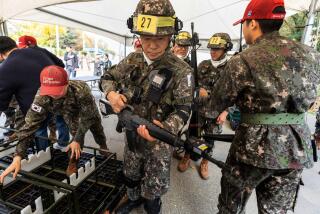Barracks shooting prompts South Koreans to call for military reform
- Share via
Reporting from Seoul — His emotional pressure valve apparently blew: The distraught South Korean Marine Corps corporal decided he’d endured enough abuse from his peers at an isolated base outside Seoul, authorities say.
The 19-year-old allegedly went to an unlocked weapons storage room this month and smuggled out an assault rifle, bullets and a hand grenade. Then he returned to his barracks on Ganghwa Island near the North Korean border and opened fire.
Shooting at least a dozen times, authorities say, he killed four marines and injured another. He’s believed to have set off the grenade then, in an unsuccessful attempt to take his own life.
The marine later told investigators he’d been singled out for abuse, and that neither superiors nor his juniors respected his rank.
“There should be no more beating or bullying,” he reportedly told investigators. “I’m so miserable. I just want to die.”
The shooting rampage, the third time in six years that a military service member has been accused of killing or seriously injuring fellow personnel at a South Korean base, has led to new calls for sweeping reforms of the “evil practices” of abuse within the nation’s 650,000-member military.
President Lee Myung-bak last week called for a military campaign “to change the culture of barracks life,” and legislators are demanding more oversight on the treatment of military enlistees.
The abuse includes beatings, cold showers and thrusting victims’ heads into toilets that are then flushed repeatedly, according to Korean press reports.
Experts are at a loss to explain the abuse. Some say the highly competitive nature among military personnel leads to many being ostracized. Violence is rarely reported.
In recent days, two marines have committed suicide at different bases — cases that officials believe involve barracks harassment. One left a note complaining of abuse and an autopsy showed signs that the man had been beaten, according to press reports. On Thursday, a third marine at another base committed suicide, and authorities said they were trying to determine whether peer abuse was involved.
Officials this month arrested another marine for allegedly assisting the suspected shooter at the barracks on Ganghwa Island. That marine allegedly told investigators he had suffered such indignities as seeing his Bible burned and having his pants sprayed with insecticide and lit on fire.
“It appears neither adjusted well to military life — they were close to each other,” Marine Corps Cmdr. Kim Yong-soo said.
The marines have yet to be charged in the case, officials say. The shooter is undergoing treatment for burns and hearing loss suffered in the grenade explosion.
Song Young-seon, a national lawmaker and critic of South Korea’s military, said there’s no question about the existence of excessive physical and verbal violence.
“I just don’t understand how burning a Bible makes anyone a better soldier,” she said. “It’s humiliating. It’s cruelty.”
South Korean officials said two commanding officers at the base on Ganghwa Island would be dismissed for failing to stop the abuse.
South Korea has four military branches — an army, navy, air force and marine corps. South Korean law requires all young men to serve two years of military duty.
In 2005, eight soldiers were killed and two seriously injured when a soldier who had complained of abuse sprayed bullets over sleeping colleagues. In 2008, an army private struggling to adapt to military life threw a grenade at colleagues as they slept, injuring five.
Also, the number of suicides by South Korean military personnel has risen over the last six years, according to a new report. Sixty-five members of the military took their lives in 2005. That number rose to 82 in 2010.
A separate report released by the South Korean military shows that in the last two years 940 marines have been hospitalized for injuries reportedly inflicted by their peers.
Song said many incidents go unreported because soldiers are afraid of being targeted for abuse if they go to superiors.
“Hazing is terrible in any culture, but in normal social life you can find new friends,” said Song. “But in the military you’re trapped. There’s nowhere to go.”
Choi is a news assistant in The Times’ Seoul bureau.
More to Read
Sign up for Essential California
The most important California stories and recommendations in your inbox every morning.
You may occasionally receive promotional content from the Los Angeles Times.













